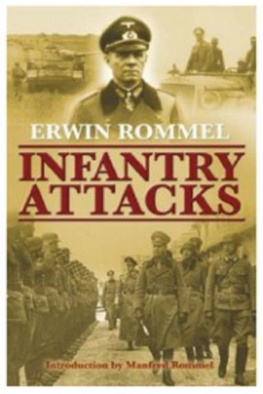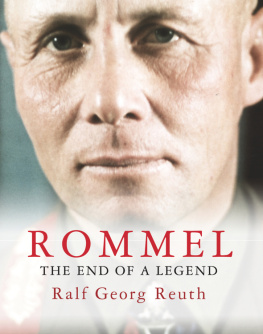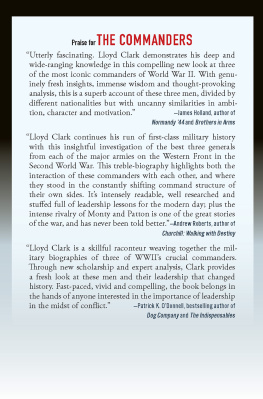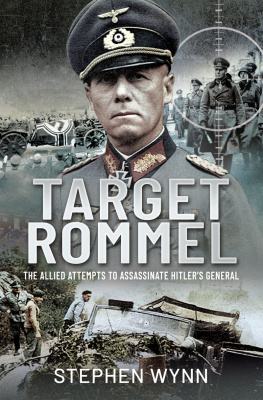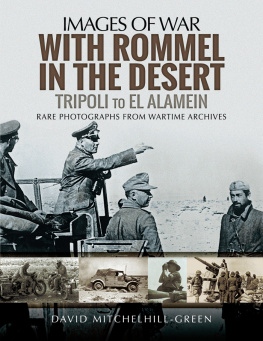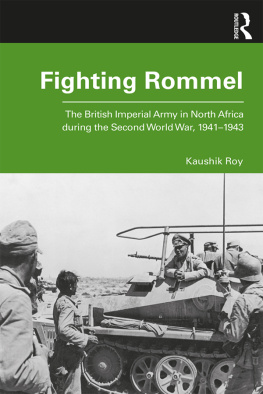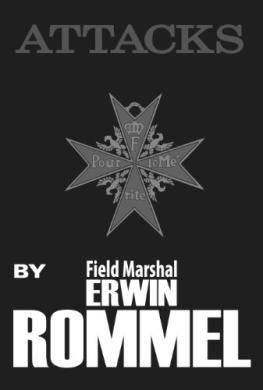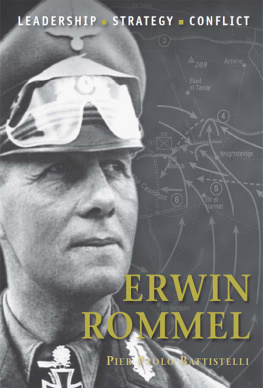INFANTERYATTACKS

ByField Marshal ERWIN ROMMEL
Table of Contents
Author'sForeword
WAROF MOVEMENT BELGIUM AND NORTHERN FRANCE, 1914
Departure
OnThe Frontier
ReconnaissanceAround Longwy and Preparations for The First Battle
ActionAt Bleid
OnThe Meuse - Action At Mont and The Doulcon Woods
ActionAt Gesnes
PursuitThrough The Argonne;
ActionAt Pretz
AttackOf Defuy Woods
FightingIn Defuy Woods
NightAttack, September 9-10,1914
RetirementThrough The Argonne
OperationsNear Montblainville; Storming Bouzon Woods
ForestFighting Along The Roman Road
COMBATIN THE ARGONNE, 1915
TheCompany Sector In The Charlotte Valley
AttackOf January 29, 1915
BeforeCentral And Bagatelle
AttackOn Central
AttackOf September 8, 1915
POSITIONALWARFARE IN THE HIGH VOSGES 1916.
WAROF MOVEMENT IN RUMANIA 1916-1917
TheNew Unit
RaidOn "Pinetree Knob"
InThe Skurduk Pass
TheStorming Of Lesului
ActionAt Kurpenul - Valarii
Hill1001, Magura Odobesti
Gagesti
NearVidra
COMBATIN THE SOUTHEAST CARPATHIANS AUGUST, 1917
ApproachMarch To The Carpathian Front
AttackAgainst The Ridge Road Bend, August 9, 1917
AttackOf August 10, 1917
TheStorming Of Mount Cosna, August 11, 1917
CombatOn August 12, 1917
OnThe Defense, August 13-18, 1917
TheSecond Storming Of Mount Cosna, August 19, 1917
AgainOn The Defensive
THETOLMEIN OFFENSIVE, 1917
DeploymentAnd Dispositions For The 12th Battle Of The Isonzo
AttackOf The First Day: Hevnik And Hill 1114
AssaultOn The Second Day, October 25, 1917 Surprise Breakthrough OnThe Kolvorat Position
AttackAgainst Kuk, Blocking The Luico - Savogna Valley And Opening TheLuico Pass
TheStorming Of Mount Cragonza
TheCapture Of Hill 1192, Mrzli Peak And The Attack On Mount Matajur
PURSUITOVER THE TAGLIAMENTO AND PIAVE RIVERS
Masseris-Campeglio-TorreRiver-Tagliamento River- Klautana Pass
PursuitTo Cimolais
AttackOn The Italian Position
WestOf Cimolais
PursuitThrough Erto And The Vajont Ravine
TheFight At Longarone
CombatIn The Mount Grappa Region

Foreword to the 1937Edition
Thisbook describes numerous World War I battles which I experienced as aninfantry officer.
Remarksare appended to many descriptions in order to extract worthwhilelessons from the particular operation.
Thenotes, made directly after combat, will show German youth capable ofbearing arms, the unbounded spirit of self-sacrifice and courage withwhich the German soldier, especially the infantryman, fought forGermany during the four-and-a-half-year war. The following examplesare proof of the tremendous combat powers of the German infantry,even when faced with superior odds in men and equipment; and thesesketches are again proof of the superiority of the junior Germancommander to his enemy counterpart.
Finally,this book should make a contribution towards perpetuating thoseexperiences of the bitter war years; experiences often gained at thecost of great deprivations and bitter sacrifice.
ERWINROMMEL
LieutenantColonel
Chapter I
Warof Movement Belgium And Northern France 1914
Departure
Ulm,July 31, 1914The danger of war hung ominously over the Germannation. Everywhere, serious, troubled faces! Unbelievable rumorswhich spread with the greatest of rapidity filled the air.
Sincedawn all public bulletin boards had been surrounded. One extraedition of the papers followed the other.
Atan early hour the 4th Battery of the 49th Field Artillery Regimenthurried through the old imperial city. Die Wacht am Rhein resoundedin the narrow streets.
Irode as an infantry lieutenant and platoon commander in the smartFuchs Battery to which I had been assigned since March. We trottedalong in the bright morning sunshine, did our normal exercises, andthen returned to our quarters accompanied by an enthusiastic crowdwhose numbers ran into thousands.
Duringthe afternoon, while horses were being purchased in the barrack yard,I obtained relief from my assignment. Since the situation appearedmost serious, I longed for my own regiment, the King Wilhelm I, to beback with the men whose last two years of training I had supervisedin the 7th Company, 124th Infantry (6th Wrttemberg).
Alongwith Private Hanle, I hurriedly packed my belongings; and late in theevening we reached Weingarten, our garrison city.
OnAugust 1, 1914, there was much activity in the regimental barracks,the big, old cloister building in Weingarten. Field equipment wasbeing tried on! I reported back to headquarters and greeted the menof the 7th Company whom I was to accompany into the field. All theyoung faces radiated joy, animation, and anticipation. Is thereanything finer than marching against an enemy at the head of suchsoldiers?
At1800, regimental inspection. Colonel Haas followed his thoroughinspection of the field-gray clad regiment with a vigorous talk. Justas we fell out, the mobilization order came. Now the decision hadbeen made. The shout of German youths eager for battle rang throughthe ancient, gray cloister buildings.
The2d of August, a portentous Sabbath! Regimental divine services wereheld in the bright sunlight, and in the evening the proud 6thWrttemberg Regiment marched out to resounding band music andentrained for Ravensburg. An unending stream of troop trains rolledwestward toward the threatened frontier. The regiment left at dusk tothe accompaniment of cheers. To my great disappointment I was obligedto remain behind for a few days in order to bring up our reserves. Ifeared that I was going to miss the first fight.
Thetrip to the front on August 5, through the beautiful valleys anddells of our native land and amid the cheers of our people, wasindescribably beautiful. The troops sang and at every stop wereshowered with fruit, chocolate, and rolls. Passing throughKorn-westheim, I saw my family for a few brief moments.
Wecrossed the Rhine during the night. Searchlights crisscrossed the skyon the lookout for enemy planes or dirigibles. Our songs had dieddown. The soldiers slept in all positions. I rode in the locomotive,looking now into the firebox then out into the rustling, whispering,sultry summer's night wondering what the next few days would bring.
Inthe evening of August 6 we arrived at Konigsmachern near Diedenhofenand were glad to be out of the cramped quarters of the troop train.We marched through Diedenhofen to Ruxweiler.
Diedenhofenwas not a pretty sight with its dirty streets, houses, and taciturnpeople. It seemed so different from my home in Swabia.
Wecontinued the march, and at nightfall a torrential downpour set in.Soon there was not a dry stitch of clothing on our bodies, and thewater-soaked packs began to weigh heavily. A fine beginning!
Occasionalshots were heard far in the distance. About midnight our platoonarrived in Ruxweiler without suffering any losses during the six-hourmarch. The company commander, First Lieutenant Bammert, awaited us.Cramped quarters on straw was our lot.
OnThe Frontier During the next few days, hard drilling welded ourwar-strength company together. Besides platoon and company exercises,we were subjected to a wide variety of combat exercises which allplaced great emphasis on the use of the spade. In addition, I spentseveral uneventful rainy days on guard with my platoon in thevicinity of Bollingen. Here some of my men and I suffered stomachdisturbances as a result of the greasy food and the freshly bakedbread.
Next page
